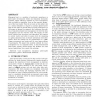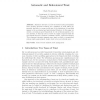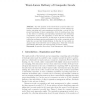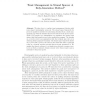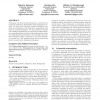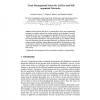CIKM
2001
Springer
14 years 4 months ago
2001
Springer
Managing trust is a problem of particular importance in peer-to-peer environments where one frequently encounters unknown agents. Existing methods for trust management, that are b...
TRUST
2010
Springer
14 years 4 months ago
2010
Springer
Academic discourse on trust is fractured along disciplinary lines. Security theorists routinely use a definition of trust which, apparently, has little in common with any of the d...
DBISP2P
2003
Springer
14 years 5 months ago
2003
Springer
Abstract. The vast majority of the interactions in typical online communities nowadays is between complete strangers. In such settings reputation reporting and trust management mod...
ESOP
2004
Springer
14 years 5 months ago
2004
Springer
We show how to combine trust management theories with nonce-based cryptographic protocols. The strand space framework for protocol analysis is extended by associating formulas from...
BIRTHDAY
2004
Springer
14 years 5 months ago
2004
Springer
In a reputation-based trust management system an entity’s behaviour determines its reputation which in turn affects other entities interaction with it. We present a mathematical...
SIGSOFT
2004
ACM
14 years 5 months ago
2004
ACM
Rapid advances in wireless networking technologies have enabled mobile devices to be connected anywhere and anytime. While roaming, applications on these devices dynamically disco...
SACMAT
2004
ACM
14 years 5 months ago
2004
ACM
We propose role-based cascaded delegation, a model for delegation of authority in decentralized trust management systems. We show that role-based cascaded delegation combines the ...
WAC
2005
Springer
14 years 5 months ago
2005
Springer
Self-organized and ad hoc communications have many fundamental principles in common and also face similar problems in the domains of security and Quality of Service. Trust manageme...
ITRUST
2005
Springer
14 years 5 months ago
2005
Springer
The term trust management suggests that trust can be managed, for example by creating trust, by assessing trustworthiness, or by determining optimal decisions based on specific le...
ITRUST
2005
Springer
14 years 5 months ago
2005
Springer
Trust is an important tool in human life, as it enables people to cope with the uncertainty caused by the free will of others. Uncertainty and uncontrollability are also issues in ...
